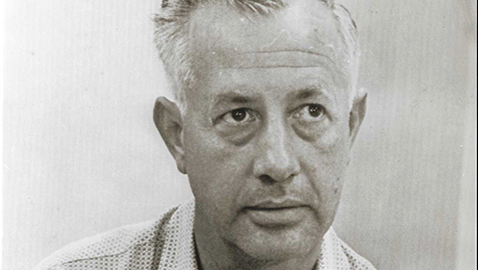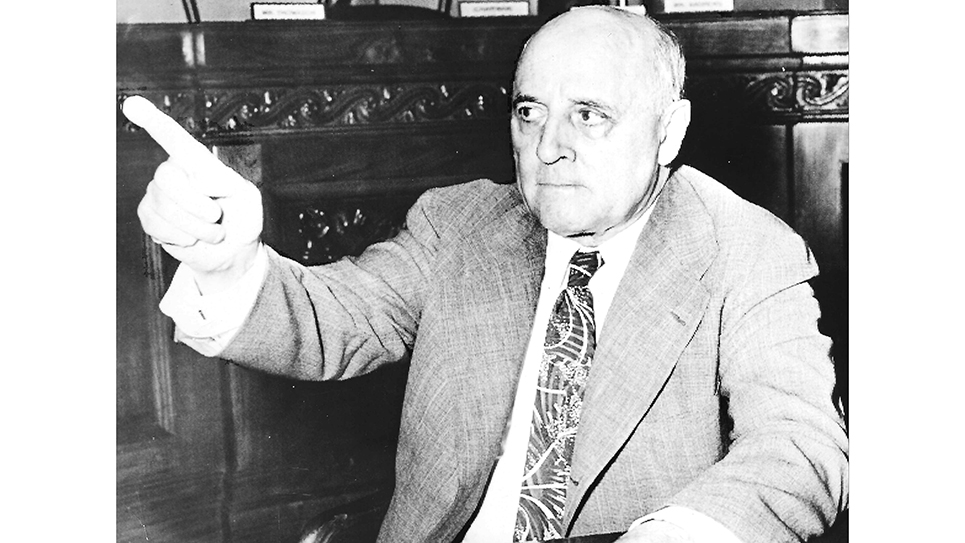By Ray Hill
Pat Sutton, congressman from Tennessee’s Seventh District, had been renominated over a strong opponent in the 1950 election and reelected that fall. Clearly ambitious, Sutton, like several other Tennessee politicians, was carefully watching Tennessee’s senior United States senator, Kenneth D. McKellar. The venerable McKellar was Tennessee’s longest serving U. S. senator (and still is); McKellar was the first person ever to be popularly elected by the people to represent the Volunteer State in the United States Senate. Senator McKellar had been highly popular with the people of Tennessee and had won reelection in 1946, defeating an opponent who had quite nearly defeated his junior colleague four years previously, without once returning home to campaign. As the election of 1952 approached, McKellar was eighty-two years old and would turn eighty-three that January. The senator was old, increasingly frail and ailing. After twelve successful campaigns for the U. S. Senate, it appeared Kenneth McKellar might finally be vulnerable.
The peppery old senator had no intention of retiring, gracefully or otherwise. McKellar had announced he would stand for a then-unprecedented seventh term in July of 1951, “God willing.” Yet as 1952 dawned, Governor Gordon Browning pondered his life-long dream of serving Tennessee in the U. S. Senate. Congressman Albert Gore of Carthage was already running hard, whether McKellar ran or not. Thirty-seven year-old Pat Sutton sent signals he would gladly run for the Senate should McKellar die in office or withdraw from the race.
Gordon Browning decided he didn’t wish to contest McKellar, even if the senator was old and sick; he opted to seek reelection as governor. Pat Sutton waited on the sidelines to replace the senator.
Sutton continued to seek out publicity, perhaps figuring it would help him should he run for statewide office. The Nashville Tennessean published an oddity saying Congressman Sutton carried on a lucrative sideline by selling men’s suits from his Washington office. According to the Tennessean, Sutton got the suits from his father-in-law who owned a clothing store in Lawrenceburg, Tennessee. Either Sutton or “a male secretary ‘measure up’ prospects to guarantee a good fit, and when business is brisk, the congressman’s office looks like a tailor’s shop with the merchandise covering tables and chairs.” Fifteen new suits arrived in one day alone and Sutton’s colleagues affirmed the prices were “reasonable and the suits are a good buy.” William B. Massey, Sutton’s father-in-law, died in Lawrenceburg in early 1952. Massey had been a successful businessman, owning an automobile dealership at one time and was “an extensive landholder and dealer in white faced cattle.” Evidently Massey had been so successful he had run afoul of the IRS who had him indicted by a federal grand jury for evading taxes on $63,020.27 in income. The case was still pending at the time of Massey’s death.
Early in January of 1952, Congressman Sutton went to McMinnville, Tennessee to speak to the Veterans of Foreign Wars statewide meeting, along with Governor Gordon Browning and Congressman Albert Gore. As Sutton waited to see what would happen with the Senate race, Reeder Parker, a local district attorney from Waverly, Tennessee, prepared to run for Congress in Sutton’s district. Sutton sent 5,000 letters throughout Tennessee to the leaders of cities and counties in the state, purportedly to seek their “counsel and guidance” to better perform his duties as a congressman. Most saw it for what it was; a transparent attempt to lay the groundwork for a senatorial campaign. Although his secretary flatly denied the letters were the precursor to a Senate race, Sutton, who was in Tennessee, was not at all coy. “As of this moment, I am a candidate for re-election to the house from the new sixth district,” Sutton said. “However, if Senator McKellar decides not to run I would seriously consider making the race for the senate.” Congressman Sutton cheerfully admitted a petition qualifying him to run for the U. S. Senate was being circulated in East Tennessee. Sutton was careful to add, “But of course, it all hinges on Senator McKellar. I’ve said before and I’ll say now I wouldn’t run against Senator McKellar.” McKellar stubbornly remained in the race, but lost the Democratic nomination to Congressman Albert Gore.
While seeking reelection to the House in 1952, Sutton said he feared the possibility of a military dictatorship should former general Dwight D. Eisenhower win the presidency. Sutton said he believed “in liberal old age benefits, survivors insurance, social security and adequate protection for the infirm.”
Reeder Parker did run against Pat Sutton for Congress, but Sutton won a smashing victory inside the Democratic primary, winning more than 65% of the vote and 52,508 votes. Parker only managed to carry one county, Lewis, in the newly drawn Sixth Congressional District. Sutton won more votes inside the Democratic primary in 1952 than any of his colleagues in the Tennessee Congressional delegation save for Joe L. Evins. It was an impressive showing and it likely caused Pat Sutton to make the mistake that ended his national political career.
There was good reason to believe Tennessee was changing. The elections in 1952 had swept out the old order; Senator McKellar had lost to forty-four year-old Albert Gore. Gordon Browning, governor of Tennessee three times, had been beaten by thirty-two year-old Frank Clement. Pat Sutton was thirty-nine years-old in 1954 and was eyeing the Senate seat of Estes Kefauver. As usual, Sutton was not at all coy, making his announcement he would challenge Senator Kefauver inside the Democratic primary well in advance of the 1954 election. The Nashville Banner blared the news of Sutton’s announcement of his candidacy in its May 18, 1953 edition. Congressman Sutton issued a statement saying a change in the Senate seat occupied by Estes Kefauver “would be to the manifest interest to all the people of this nation…” Sutton said it was for that “reason alone” he would run for the U. S. Senate in 1954. Evidently, Senator Kefauver was somewhat surprised by the abrupt announcement of Sutton’s candidacy. When queried by the members of the press, the senator murmured, “No comment.”
Pat Sutton ran an extraordinarily well-funded race against Estes Kefauver for the Democratic senatorial nomination. Reputedly, much of the money came from Texas oil interests. Sutton used “talkathons” on the relatively new medium of television to promote his senatorial campaign and arrived at appearances in a helicopter, which was then a novelty and drew considerable interest from crowds. Sutton ran well to the right of Kefauver, who was not a good speaker, but the senator had kept his political fences in Tennessee well mended. Moreover, Estes Kefauver was a remarkably able one-on-one campaigner. There are those who still believe Estes Kefauver had no peer in his ability to connect with voters in one-on-one settings. At the time, contemporary observers thought Pat Sutton’s determined drive for the Democratic nomination might well be successful. One of Sutton’s TV talkathons ended with a statement from former Senator McKellar blistering Kefauver. The eighty-five year-old McKellar said Kefauver was “not the kind of man Tennessee ought to have in the Senate.” McKellar said Tennesseans should defeat Senator Kefauver. They did not. In fact, Estes Kefauver won a stunning victory in the Democratic primary. Pat Sutton carried only four of Tennessee’s ninety-five counties; his own Lawrence County and three small counties in West Tennessee. Estes Kefauver won just over 68% of the vote and beat Sutton by more than 250,000 votes. It was a humiliating defeat for Pat Sutton.
Sutton made a quixotic bid to become Clerk of the U. S. House of Representatives in 1955 that went nowhere. Pat Sutton’s candidacy was doomed from the beginning, especially after members of Tennessee’s delegation in the House pointedly signed a letter stating they were not supporting any candidate other than Sergeant At Arms Zeke Johnson. Still, Pat Sutton was not done with politics.
Sutton’s successor in Congress was Ross Bass, a veteran of World War II and former postmaster of Pulaski, Tennessee. Pat Sutton challenged Bass for the Democratic nomination in 1956 in a comeback bid. Bass and Sutton fussed about the former congressman’s appointments to military academies, but newspapermen noted a change in Sutton’s demeanor. Tom Flake of the Nashville Banner wrote about the “quieter, calmer Pat Sutton” who energetically pressed the flesh at rural stops throughout the district. Sutton admitted Bass was “a prince of a fellow” and claimed he had nothing at all against his successor, yet the former congressman claimed Bass had an astonishing ability to be on every side of every issue. Bass had refused to sign the infamous “Southern Manifesto” and Sutton told listeners, “I would have signed it.” Pat Sutton said he was for segregation. Voters in the Sixth District stuck with Ross Bass. Bass carried every county in the district except Lawrence, which was Pat Sutton’s home. Even in Lawrence County, Sutton only barely eked out a win.
Sutton’s next bid for public office was more successful. The former congressman ran for sheriff of Lawrence County as an Independent, contesting with a Democratic and Republican candidate in the 1962 general election. Lawrence County was still a largely Democratic county and the prospects of an Independent were slim. Considering that Pat Sutton had been arrested by federal agents for counterfeiting the week before the election, his victory is all the more astonishing. Sutton sailed past Democrat Aubrey Shackleford by more than 1,300 votes on the night of the election. The former congressman dismissed his arrest as “political” and quipped he “wouldn’t know a counterfeit bill from a good one.” The alleged counterfeiting was supposedly centered in Knoxville and involved a quarter of a million dollars in counterfeit bills. Pat Sutton was accused of carrying phony bills. Sutton said he received six $50 bills as a contribution to his campaign for sheriff of Lawrence County. “I think the people of this county know me well enough to know I wouldn’t be involved with any counterfeit ring,” Sutton said.
Pat Sutton remained as colorful as always. During his campaign for sheriff, he had promised to burn down a building beside the county jail. Following the election, he kept his pledge and set it on fire, necessitating the local fire department to bring the blaze under control. Sutton also burned 14 mattresses from the jail on the front lawn, as he had also promised new mattresses for the jail house. Even the people of Lawrence County seemed to be tiring of Pat Sutton’s antics. Sutton had lost his bid for renomination as sheriff in the 1964 election. Later he pleaded no contest before a federal judge in “a surprise appearance” in court. Judge Clarence Allgood sentenced the former congressman to one year in prison, but suspended the sentence. Earlier, a jury had been unable to reach a verdict when Sutton and his brother had been tried.
Sutton operated the Raven Bluff Club in Lawrenceburg, which caused a judge to rule the former congressman had violated the conditions of his probation and send him to prison. The judge believed the sale of beer at the private club was a violation of Pat Sutton’s probation. Sutton remained in prison for about ten months.
Pat Sutton’s last hurrah was a race for Congress in 1976. Sutton ran as a Democrat to face the incumbent congressman, Robin Beard, a Republican. Sutton’s opponent in the Democratic primary was his old foe, Ross Bass. Sutton did little more than place his name on the ballot and Bass won the primary easily. Pat Sutton won slightly less than 15% of the votes cast in the Democratic primary. It was the end of a colorful and oftentimes tumultuous political career.
Pat Sutton and his wife, Doris, moved to Michigan where the former congressman became interested in the restoration of antiques. The couple had six children together. Pat Sutton died at age eighty-nine at a hospital in Berrien Center, Michigan.







